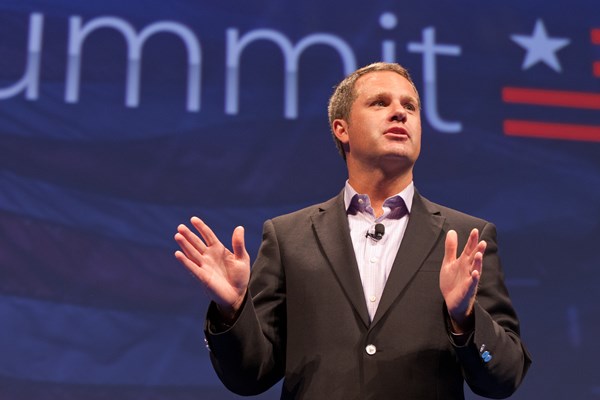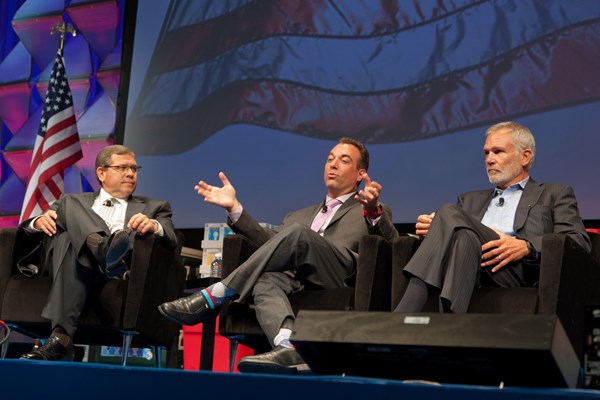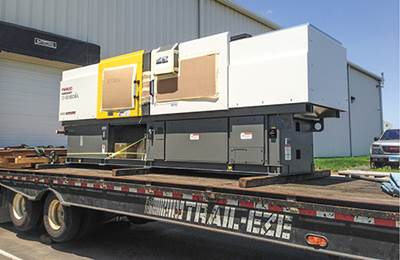Wal-Mart's Made in America Pledge and Plastics
The world's largest retailer has committed to sourcing and additional $50 billion in U.S. made goods over the next decade; what does it mean for plastics processors?

For the outsized influence it exerts on manufacturers the world over, there’s one important thing to remember about Wal-Mart, a basic fact stated by company President CEO Doug McMillon during that company’s second U.S. Manufacturing Summit held in Denver.
“We don’t make anything,” McMillon, pictured above, said. “We can’t provide value to customers on great items like these and others without having a strong collaborative relationship with you.”
The “you” referred to the more than 200 component part suppliers and contract manufacturers that had come to Denver for the second iteration of the summit, hailing from 42 states and Puerto Rico.
The “these” referred to the array of U.S. made merchandise stacked around the stage—easily recognizable brands and products as ready props to substantiate the retailer’s January 2013 pledge to source an additional $50 billion in U.S. products over the next decade.
It was that pledge that launched the inaugural U.S. Manufacturing Summit held in Orlando last year. The event is meant to serve as a matchmaking mixer between brand owners and U.S. manufacturers, giving the Procter & Gamble’s of the world a face and a name for a U.S. option to manufacture its various brands.
Setting the stage
In the minutes before the event began, workers from the Denver Convention Center and Wal-Mart representatives scurried around the auditorium stage, rearranging the product props that ranged from plastic bins and coolers to tires, TVs and light bulbs, with household names like Crest, L’Oreal, Good Year, and John Deere represented.
As I settled into my seat accompanied by a media handler, a Wal-Mart representative rushed past, saying aloud the instructions relayed to him on his headset: “Candles with the Old Spice and Connect 4 with the games.”
With every product positioned, a video, preceded by Toby Keith’s “Made In America” playing on the loudspeakers, launched the proceedings. On the large screen above the center of the stage, a camera panned across an abandoned factory, while a narrator intoned, “It’s time to get back to what America does best.”
Theatrical to be sure, but the summit, which also featured a exposition hall for manufacturers to pitch their skills to reshoring-inclined brand owners, was very much a practical exercise in connecting companies.
Michael Araten, president of K’NEX Brands, which includes injection molder, The Rodon Group, sat on a panel with Jim Stephen, executive chairman of Weber-Stephen Products LLC, maker of the iconic Weber grills.
Just during their brief time back stage, Araten had already pitched Rodon’s molding capabilities to an interested Stephen for wheels and other plastic elements of the company’s barbecues. Araten himself was on the lookout for new suppliers.
“I’m looking for toy motors and I hope I find them tomorrow,” Araten noted. Earlier in the event, a Wal-mart executive encouraged attendees to interact with people around them, noting that the person sitting next to them could supply “the key thermoplastic compound” needed for a new product.
Lincoln Logs, Made in the U.S.A. again
Araten also helped lay out the challenge faced by brandowners looking to reshore production that had been shipped overseas years ago. He announced that for the first time in 60 years, production of Lincoln Logs would return to the U.S., a move made possible with Wal-Mart’s help.
“I want to thank Wal-Mart for doing what it is doing here, which is connecting people,” Araten said. Without events like the one in Denver, Araten explained that K’NEX had resorted to the “pick and shovel work of little Google searches” as it tried to reshore production, with mixed results.
“It took us four tries to find factories that could not only do it and achieve the quality,” Araten said of Lincoln Log production, “but do it in the high volume you need to fulfill the scale of places like Wal-Mart.”
And that last comment is indeed part of the challenge. Wal-Mart, and its vendors, are cold-calling U.S. manufacturers at a time when many have been greatly diminished by a decade of offshoring driven in part by a lower-costs-at-all-costs mentality. To its credit, the retailer gets that and is trying to help U.S. industry regain its footing.
Always low prices
“Yes we want to offer a value,” McMillon said, noting the retailer’s mentality is to run a low margin on high volume, adding that it wants its suppliers to “have a like mind about that.”
But, McMillon noted, that’s no longer the entire bottom line. “We want you to be able to make money, and we want you to invest in your business for the long term,” McMillon said. “We want you to innovate, to invest in R&D and create the next new item for next year or years beyond so it’s important that we have that kind of open, trustful dialogue as we do it together.”
On the innovation front, Wal-Mart’s U.S. Manufacturing Innovation Fund issued $4 million in grants to seven research and development institutions to “create new processes, ideas, and jobs that will foster America’s growing manufacturing footprint.”
Oregon State University has been chosen for one of the first seven grants from the Walmart U.S. Manufacturing Innovation Fund created by Walmart and The Walmart Foundation to help accelerate manufacturing in the United States.
Among these was Oregon State University, which received a $590,000 grant for the development of innovations in injection molding; and Indiana University-Purdue University Indianapolis (IUPUI), which received a $291,202 grant to support its “Optimal Plastic Injection Molding Tooling Design and Production through Advanced Additive Manufacturing,” research project.
‘Stronger economy for everyone’
McMillon sees the summit in Denver, and its overall Made in the U.S.A. push of the last several years, as seizing on an important occasion. “In the U.S., we believe this window of time, these last few years and the years to come, create a great opportunity for us to lean in, do things more aggressively and differently than we would have before and convene groups like this one to create together the situation where U.S. manufacturing can grow and be successful and create an even stronger economy for everyone.”
To pass time in the car, my eldest daughter often counts Wal-Mart trucks. We spend a fair amount of time on the main north/south interstate by our house, and there is a Wal-Mart distribution center 25 miles north on that same highway, so on longer drives, it’s not hard for her to reach some pretty big numbers.
Since the summit, it’s been reassuring for me to visualize those trucks being filled with more and more U.S. made goods (many of the plastics heavy) and see more and more “Made in the U.S.A.” stickers on Wal-mart’s shelves. Hopefully it’s a trend other retailers and brand owners emulate. (Pictured below from left: Walmart U.S. Chief Merchandising & Marketing Officer Duncan Mac Naughton, Michael Araten of K’NEX and Jim Stephens of Weber Stephens).

Read Next
‘Reshoring’ Is Not a Myth
For this molder, 35% to 40% of current sales is new business generated in the past two to three years—and some of that is due to reshoring.
Read MoreBeyond Prototypes: 8 Ways the Plastics Industry Is Using 3D Printing
Plastics processors are finding applications for 3D printing around the plant and across the supply chain. Here are 8 examples to look for at NPE2024.
Read More
























